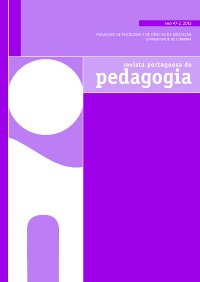Please use this identifier to cite or link to this item:
https://hdl.handle.net/10316.2/34418| Title: | O processo educativo humano à luz de Platão | Other Titles: | The educational process according to Plato Panorama general del proceso educativo en el mundo clásico según Platón |
Authors: | Xavier, Dennys Garcia Walter, Karla Cristina |
Keywords: | Educational process;Relativism;Idealism;Philosophy;Classical pedagogy;Processo educativo;Relativismo;Idealismo;Filosofia;Pedagogia clássica;Proceso educativo;Relativismo;Idealismo;Filosofía;Pedagogía clásica | Issue Date: | 2013 | Publisher: | Imprensa da Universidade de Coimbra | Abstract: | El estudio de las estructuras pedagógicas y formativas de la Antigüedad
Clásica puede arrojar luz sobre los aspectos educativos humanos esenciales,
haciéndose eco de muchas maneras, en la época contemporánea. Una
breve mirada en el proceso educativo de tal momento revela las tensiones
que todavía existen en nuestro tiempo, como el choque entre el idealismo
y el relativismo: un binomio que en el curso de la historia humana, insiste
en no ser capturado en un solo punto de reconciliación. El mejor representante
de esta confrontación es Platón, que en su Teeteto, establece un
marco para la evidencia argumentativa que da voz a los polos. Pero aquí
no se trata simplemente de explorar diversas filosofías y algunas de sus
consecuencias más evidentes. Desde la oposición entre el relativismo y
el idealismo, Platón describe un programa educativo‑pedagógico
fuerte,
en lo que la imagen del hombre ilustrado, de formación filosófica, se superpone la de un hombre del pueblo, formado por las exigencias de la
vida diaria acrítica, no investigada. En este sentido, se propone analizar el
marco teórico del análisis platónico y la estructura pedagógica que deriva
del mismo. Por lo tanto, se investigaron los textos‑clave
del corpus escrito
del filósofo ateniense, así como la literatura secundaria, referida al tema. O estudo das estruturas pedagógico‑formativas do Mundo Antigo Clássico pode jogar luz sobre aspetos educativos humanos essenciais, que ecoam, de diversos modos, na contemporaneidade. Um sintético, mas criterioso olhar para o processo educacional naquele Mundo revela tensões que se verificam ainda hodiernamente, como o embate entre o relativismo e o idealismo: um binómio que, no decorrer da história humana, teima em não se deixar capturar num único ponto de conciliação. Representante máximo de tal embate é Platão, que em sua obra Teeteto, estabelece um campo de provas argumentativo que dá voz àqueles pólos. Mas não se trata aqui tão‑somente de explorar correntes filosóficas diversas e algumas das suas mais óbvias consequências. A partir da contraposição entre relativismo e idealismo, Platão delineia um programa pedagógico‑educativo forte, no qual a imagem de homem ilustrado, de formação filosófica, se sobrepõe à de um homem do povo, formado pelas exigências acríticas da existência quotidiana, não refletida. Aqui, pretende‑se analisar o arcabouço teorético da análise platónica e a estrutura pedagógica que dele deriva. Para tanto, foram investigados textos‑chave do corpus escrito do filósofo ateniense, bem como bibliografia secundária atinente ao tema. The study of pedagogical and formative structures of the Ancient World can throw light on the essential human educational aspects, echoing in many ways, in contemporary times. A concise but insightful look into the educational process in the Ancient World reveals tensions that still exist at the present time, such as the clash between idealism and relativism: a conflict that in the course of human history, insists on not being captured in a single point of reconciliation. The highest representative of such confrontation is Plato, who in the Theaetetus, establishes a framework for argumentative evidence that gives voice to those poles. But this is not merely to explore different philosophies and some of their most obvious consequences. From the opposition between relativism and idealism, Plato outlines a strong educational‑pedagogical program, in which the image of an illustrated man, with philosophical training, overlaps that of a man of the people, formed by the uncritical demands of the unreflective daily life. Here, we intend to analyze the theoretical framework of the Platonic analysis and the pedagogical structure resulting from it. Thus, we investigated the key‑texts of the written corpus of this Athenian philosopher, as well as secondary literature regarding this topic. |
URI: | https://hdl.handle.net/10316.2/34418 | ISSN: | 1647-8614 | DOI: | 10.14195/1647-8614_47-2_1 |
| Appears in Collections: | Revista Portuguesa de Pedagogia |
Files in This Item:
| File | Description | Size | Format | |
|---|---|---|---|---|
| 01_o_processo_educativo_humano___luz....pdf | 1.35 MB | Adobe PDF |  |
Items in DSpace are protected by copyright, with all rights reserved, unless otherwise indicated.
